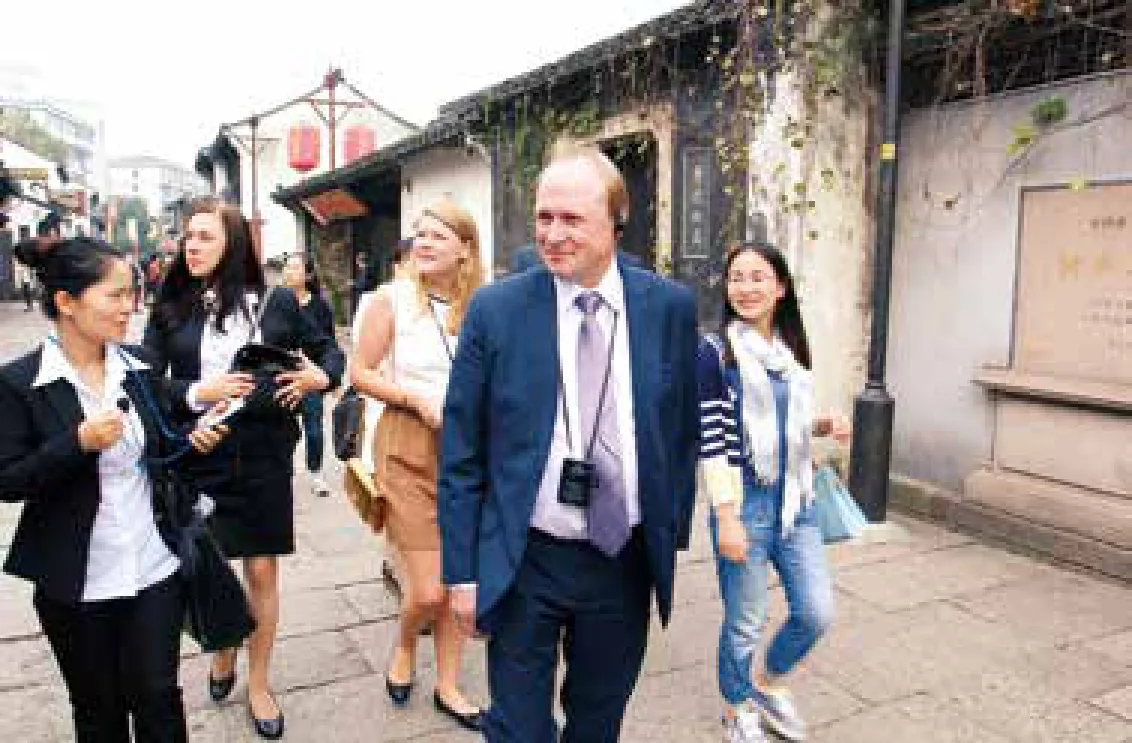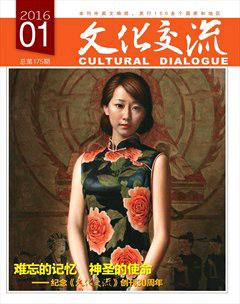Lu Xun and Tolstoy: Dialogue
By Yu Lu
Lu Xun and Tolstoy: Dialogue
By Yu Lu
Leo Tolstoy said he could have visited China if he had been younger. On October 13, 2015, his wish came true when his great grandson Vladimir Tolstoy and two other Tolstoys arrived in Shaoxing in eastern Zhejiang for a dialogue about Lu Xun and Tolstoy, literary giants in their respective countries. On the Chinese side were Zhou Lingfei, the grandson of Lu Xun, the penname of Zhou Shuren, three other experts specialized respectively in the studies of Lu Xun and Tolstoy.

叶卡捷琳娜·托尔斯塔娅在“大师的容颜—列夫·托尔斯泰影像展”开幕式致辞。Ekaterina Tolstoya speaks at the photo exhibition that features Leo Tolstoy in Shaoxing in October 2015.
The event was composed of a Tolstoy photo exhibition and a forum on the two giants. The experts talked about the role the two authors played in cultural exchanges between the two countries, thesimilarities of their thought, the influences of their works on readers in both countries and the present-day cultural evaluation of their legacy.

俄罗斯代表团成员参观鲁迅故里。The Russian guests visit the birthplace of Lu Xun in Shaoxing.

俄罗斯客人坐上乌篷船游览绍兴。The Russian guests take a boat tour in Shaoxing.
Tolstoy (1828-1910) was mainly an author of the 19th century whereas Lu Xun (1881-1936) was active as a writer in the 20th century. They were contemporaries for about 30 years, but they never met. Lu Xu spared no efforts to introduce Russian culture to the Chinese readers whereas Tolstoy read Lao Zi and Confucius and his private library at his home had a lot of books about China. Lu Xun launched a commemorative issue of a monthly literary magazine in celebration of the 100th anniversary of the birth of Leo Tolstoy while working there as editor-in-chief. ”Reading Tolstoy's articles at night, I gradually saw the hope of mankind,” wrote Lu Xun in the special issue.
The photo exhibition was jointly sponsored by Lu Xun Memorial Museum of Shaoxing and Yasnaya Polyana Tolstoy Family Estate-Museum. Leo Tolstoy left behind him a library and other objects at the family estate. Today, the Yasnaya Polyana estate-museum is a UNESCO world heritage site and attracted 208,000 visitors in 2014.
Tolstoy is an influential figure in China as he is widely read. He symbolizes not only Russian literature but also the world Literature. Lu Xun is also widely read in Russia. Lu Xu has been translated into more than 50 languages. He is widely revered by critics and authors in Russia. Russian was the first foreign language translation of A Madman's Diary, a masterpiece written in 1918 by Lu Xun.
On the afternoon of October 15, the forum was held at the lecture hall of the Library of Zhejiang Yuexiu Foreign Languages College. Teachers and students interacted with the visitors in both Chinese and Russian. Vladimir Tolstoy gladly accepted the engagement as a guest professor with the college.
The Russian guests visited the childhood home of Lu Xun and Shaoxing Intangible Heritage Museum. They spoke highly of the glorious culture and history of the ancient city.
“Dialogues of Masters” is an international exchange program of Shaoxing. In October, 2014, “Lu Xun and Victor Hugo: Dialogue”was held in celebration of the 50th anniversary of the founding of diplomatic relations of China and France. The event was a big cultural stir in China and won a lot of support. Launched and operated by Lu Xun Cultural Foundation, the annual dialogue program promotes exchanges on a people-to-people basis. Experts comment that the dialogues can enhance academic studies, strengthen exchanges of descendents of the masters, and build up cultural ties between hometowns and museums of the masters. They point out that the dialogue program enables the world to know more about Chinese culture and introduces the international culture to China.
Zhou Lingfei is more ambitious about the program. He says to the effect that we need to understand the cultural similarities of these masters and appreciate their popularity with people. He points out that this understanding can further promote exchanges and cooperation in culture, education, health, tourism between countries.
- 文化交流的其它文章
- 展现浙江文化繁荣的绚丽画卷——文化大省建设篇
- A Review of the 30 Years of Cultural Dialogue
- 搭建 金桥三十年——中外文化交流篇
- Writing New Chapters for Cultural Prosperity and Playing New Symphony for International Exchanges -In Commemoration of the 30 Years of Cultural Dialogue
- Lu Yanshao: Master of Traditional Chinese Landscape
- Great Achievements

